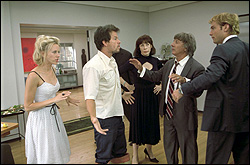Whether you admire his screwball comedy Flirting With Disaster (as I do), or are rushing out to buy the DVD reissue of his Gulf War satire, Three Kings (which I am not), David O. Russell inspires a certain lunatic respect with his slapsticky new existential detective movie I ♥ Huckabees (which opens Friday, Oct. 8, at the Egyptian and other theaters). One of the oddest and most sui generis films this year, it bears the indelible stamp of a maverick writer-director whose on-set behavior, recently documented in The New York Times, sounds like that of a manic-depressive off his meds. Jason Schwartzman (Rushmore), Dustin Hoffman, Lily Tomlin, Jude Law, Mark Wahlberg, and Naomi Watts were evidently so eager to work with the guy on this relatively low-budget production that they endured his half-naked directorial style of cursing, cajoling, and cooing to get what he wants. Sad to say, their suffering wasn’t worth it—though it provides a teetering fascination to see where they crash.
Apart from Wahlberg, never an actor to inspire much love, the big cast shows an endearing willingness to jump over the edge, like so many lemmings, under Russell’s command. His professed method is to keep everyone off balance—the audience included. It works all too well. Our protagonist, environmental activist/poet Albert (Schwartzman), is a mess who doesn’t know what he wants out of life or work. When he thrice encounters the same tall, mysterious Sudanese refugee, he seeks out a husband-and-wife team of “existential detectives” (per their business card) to make sense of the coincidence. Albert’s reasoning: It has to mean something, doesn’t it?
An unlikely pair of metaphysical gumshoes, the Jaffes (Hoffman and Tomlin) aren’t providing any easy answers. Vivian takes the empirical approach and Bernard the holistic track. They separately shadow and counsel Albert in sessions that seem like therapy, yet they deny taking him on a couch trip. Bernard zips Albert inside a body bag to free associate on his life, leading to some charmingly faux-naive computer graphics that demonstrate his fears and desires. It’s not a Spike Jonze/Charlie Kaufman sort of fun-house effect that disturbs and disorients, but more like a demented Disney ride through Albert’s thick skull. His quest to understand what Vivian calls “the big everything” is the Pilgrim’s Progress of an innocent, spoiled, and self-absorbed adult, who claims he was “orphaned by [the] indifference” of his parents.
EVEN SAM SPADE turned down the occasional client, and it’s hard to see why the Jaffes bother with Albert. Apart from his spiritual desire for “connection” (Bernard’s mantra), he’s an untalented prick, no more capable of writing good poetry than he is of saving wetlands. His antipathy toward Huckabees superstore junior executive Brad (Law) doesn’t lend him much more depth. Sure, he dislikes Brad’s smooth, shallow self-regard, but at least Brad knows he’s shallow, while Albert’s lodged in self-denial. (Inevitably, Brad’s ambivalence leads him to the Jaffes.) Then there’s Brad’s girlfriend, Dawn (Watts), an unhappy spokesmodel for the Huckabees chain; judged entirely by her looks, taken for granted by Brad, she also finds herself knocking on the Jaffes’ door.
Last on the Jaffes’ client list is cynical firefighter Tommy (Wahlberg), who’s quick with a punch but not averse to self-reflection. Opposed to the use of fossil fuels, he finds a soul mate in Albert, since both of them constantly bicycle about greater L.A. Viewers, however, will have trouble keeping up with the movie’s constantly shifting gears: Russell may have Altman-esque ambitions, but his characters aren’t connected in the same way. What makes Nashville or Short Cuts work is that nobody’s worried about their authenticity; they just act, for better or worse, according to their drives and desires. Here, the Jaffes’ waiting room fills up with basically passive whiners pleading for their help. It’s no wonder, then, that the most interesting relationship in the film is their battle with rival French therapist Caterine (the great Isabelle Huppert of 8 Women).
No niceties here. Caterine’s philosophy (and business card) amounts to “cruelty, manipulation, and meaninglessness.” First Tommy succumbs to her nihilism, then Albert to her charms. The latter two practice a form of therapy in which, Caterine explains, “two people share the deep sorrow of existence.” Or, as we Americans call it, have sex.
So in one camp we have the Jaffes and Bernard’s warm “blanket” theory of interconnectedness. In the other, Caterine’s coldly monadic model—we’re all free agents in a randomly governed cosmos, mon cher. In the middle, lost, are Albert and company (and us, too). It’s kind of like the wave-particle debate, only Russell’s thrown out the textbook. Everyone’s looking for Zen transcendence within the everyday, but the movie doesn’t support its own philosophical zigzaggery. The connections are cons—something like Russell’s own directorial method. He’s a bit of a bully and a guru, too: Actors get mashed; their characters are smashed together, and what’s left is a metaphysical hash of enlightenment. You don’t believe any more in Albert’s final happiness (if that’s what it is) than in his initial unhappiness. Huckabees becomes a mere device for Russell to riffle the encyclopedia of philosophy from A to Z, but he never spells out his QED.
The reliable pros in the picture are Hoffman, Tomlin, and Huppert, all apparently able to maintain their dignity against Russell’s antics. Watts, wasted here, will receive better handling from the big mitts of King Kong. Schwartzman has yet to develop much as an actor; he’s better at peevish than pondering. Law’s smug golden-boy fragility is effective, but he’s just not cut out for supporting-actor work. Even if Alfie (Oct. 22) turns out to be a dreadfully unnecessary remake, at least his heel will be center stage, where he belongs. Oh, and Russell’s also made a new half-hour documentary about the last Gulf War, Soldiers Pay, just in time for the election. Though it’s uncertain for a Seattle release, I’ll bet that his antiwar anger provides a shape that the cheerfully baggy Huckabees lacks.








